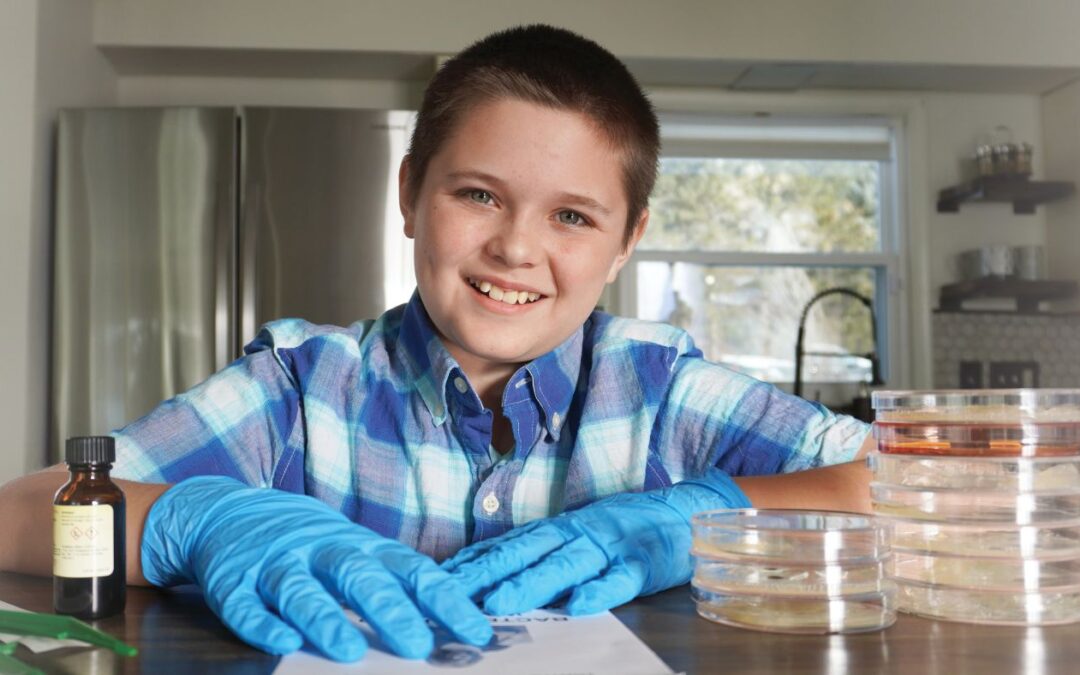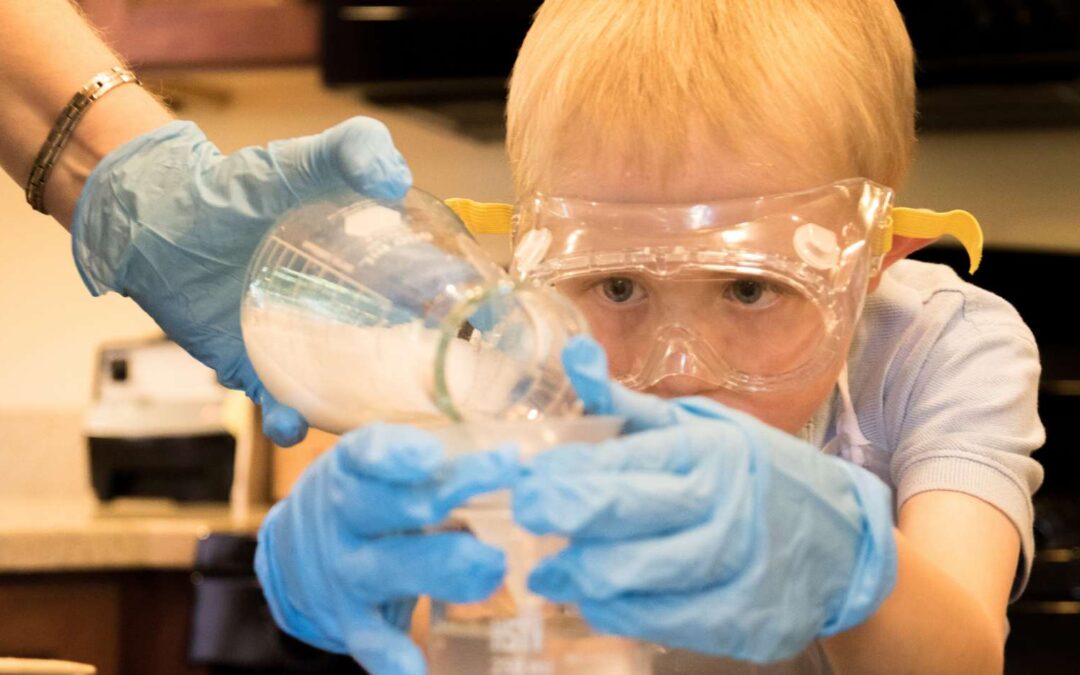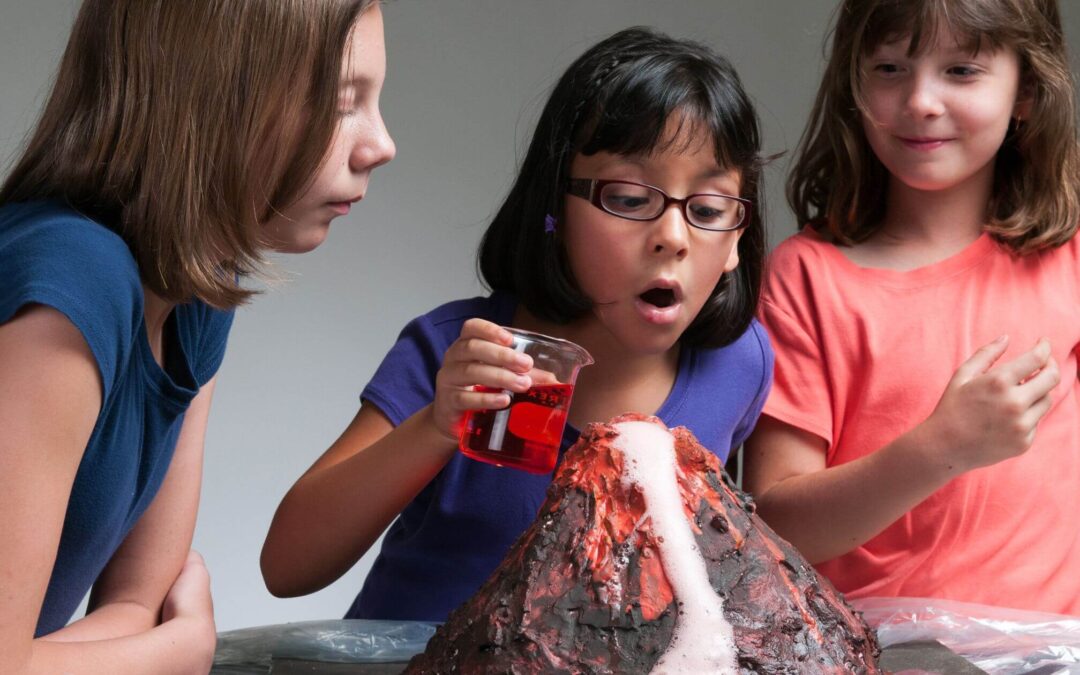So, you were tasked with hosting a science fair event at your homeschool co-op. Now you’re overwhelmed at the thought of planning a successful science fair. Maybe you weren’t homeschooled. Perhaps you weren’t interested in science. Regardless, there is something about a science fair that brings everyone together, making it the perfect event to host at your homeschool co-op.
What is a Homeschool Science Fair?
“A science fair is a competitive event hosted by schools worldwide. The distinguishing characteristic of a science fair is that the project entries employ the scientific method to test hypotheses. Science fairs are not exhibits or mere displays of projects.” ~Wiki
So, how does an individual plan a successful science fair? Good question!

Steps to Hosting a Science Fair at Your Co-Op
This easy-to-follow science fair planning guide will have you on your way to creating a successful science fair for middle school or high school students in no time. You can print this out to use as a template to guide you. Before you know it, you’ll be science fair central!
Step One: Secure Your Location
If you’re already part of a co-op, the facility that hosts the co-op is adequate to host your homeschool science fair event. However, there are a few things to keep in mind when considering the space:
- Is the area large enough for the expected crowd?
- Is there a fee involved to use the space?
- Are you able to decorate the facility?
- Are tables and chairs available to have the science fair projects on display?
- Will you provide your set-up and take-down?
- Is there a time you must be finished and out of the space?
- Are there any rules or regulations governing outside promo?
Once you’ve secured your space, you’re ready for the next step – attracting science fair participants.
Step Two – Inviting Participants to Your Homeschool Science Fair at Your Co-Op
You’ll want to be sure you come up with a set of guidelines for your fair. Outlining the rules for the fair, who can participate, the number of participants, the age range of participants, who will be your panel of science fair judges, and more! The more questions you can answer upfront as a planning committee, the better prepared you’ll be when parents and participants begin asking questions.
- Will participants be restricted to co-op members only? If not, Will there be a review process for applicants?
- What is the date of the science fair? What are the deadlines and due dates?
- Who will be the go-to person responsible for handling sign-ups for the science fair and fielding questions?
- Will there be a maximum and a minimum number of participants?
- Will there be an age range or grade level required for participation?
- How will you invite competitors? Do you plan to email the invitation? Make flyers? Social media?
- Will you create an information packet to guide competitors through the participation process?
- Is there a cost to participate? If so, who will handle the money?
- The more participants your homeschool science fair hosts, the more significant the learning opportunity for everyone involved.
- Will there be an award’s fair? Will you need to come up with special awards?
- Who will judge the science experiments?
Step Three – Prepare Your Participants
If you desire max participation in your homeschool event, plan to prepare your participants. For many students and families, this will be their first fair.
Here are some tips and ideas to help prepare your kids:
- Partner with your co-op’s science teachers and host informative workshops on the scientific method of hypothesis, research, experiment, and conclusion. Demonstrate!
- Consider creating a calendar of lesson plans or learning activities to spark interest in participation.
- Encourage previous competitors or students with prior experience with a home school science fair to share their projects or talk about their experience. Past competitors could even consider being a mentor to new competitors. An older high school student with an elementary school student could be a great partnership!
- Make it easy to participate and get questions answered.
- Be sure to let the participants know if you’ll have an awards ceremony, and what kinds of awards there will be. Will you just do 1st, 2nd, and 3rd place ribbons for the finalists in the fair? Or maybe you’ll do a “Best in fair” award, too. Will finalists go on to compete in a regional science fair or state science fair perhaps?
- Balance the fun with the serious. Science is fun!
Step Four – Create A Count Down
Breaking down the bigger project concept of hosting a science fair event at your co-op into mini-goals can help the event run smoothly. We’ve listed out mini-goals below in a calendar format. Of course, be sure to add to it as needed, but this format will help get you started and you stay on track.
Calendar for Hosting a Science Fair
6-12 months ahead
- Set the event budget
- Secure the space & event date
- Come up with event guidelines
6 – 9 Months in Advance
- Partner with science teachers to create activities calendar.
- Secure your science fair judges
3 Months Out
- Create participation packet and advertising flyers if using and submit to the printer
- Begin Inviting your families, maybe host an info meeting. Be prepared to answer questions.
- Purchase decorations for the space.
1-3 Months Ahead
- Advertise to other Co-op’s and homeschoolers
1 – 2 months Out
- Collect any fees from participating families.
- Plan your space & flow layout.
- Enlist volunteers for setup & tear down
- Enlist volunteers to assist on the day of the event.
2 Weeks Before the Event
- Follow up with volunteers, budget spending, printing needs, and family questions.
1 Week Before the Event
- Elicit feedback from the committee and science team to determine and execute any last-minute needs.
Day Before the Science Fair Event
- Pack all decor, etc., for the morning of the event. Then, if possible, begin setup today!
Goals for Participating Families and Students
Each family that chooses to participate in the event will need to have an outline for what their calendar might look like leading up to the event, as well.
Upon Invite
- Set a time aside to talk to your students about participation interests. Jot down questions and concerns they have and plan to follow up with the answers.
- As soon as practical, reach out to your Co-op science teachers to have any questions answered.
- Put the date on your homeschool calendar.
45 days
- Make a list of supplies you’re likely to need (display board, table decoration, experiment needs, notebooks).
30 days
- If practical, invite family and friends.
- Create a checklist for your students to help keep them on track.
- Be prepared for your students to change their minds about a topic & consider setting a cut-off date for topic choices. Encourage diligence. Share stories of scientists who persevered in pursuit of testing their theories.
Two weeks out
- Make final supply purchases and create a space for crafting the display board.
One week out
- Revisit your student’s progress and checklist.
Two days out
- What do you need to do to have the project completed?
Night before
- Celebrate and sleep! You’ve worked hard to prepare and tomorrow will be a big day!
For the Student Participating in the Science Fair
Before you begin, you’ll want to discuss the event with your science teacher or parent. You’ll want to know about the science fair guidelines.
A rubric can also give you project ideas that you might not have thought of. When you begin preparing for the fair, ask for a rubric to help you structure your project.
A trip to the library or reading through a science journal could prove helpful in choosing a topic. Once you’ve chosen your topic you can begin your background research.
There are many types of science projects to choose from. You can find all sorts of science fair project idea supplies here to help you brainstorm and get started. Depending upon your age or grade level, some ideas for your fair experiment could include:
- simple machines
- model building the solar system
- weather-related projects
- types of dinosaurs
- environmental science-based experiments
- exploring mold, germs, bacteria, viruses
- physical science-based experiments
- life science research paper
- robotics
If all of that wasn’t enough to get the ideas flowing, maybe you can find some ideas here. Once you’ve come up with an idea, you can find helpful tips here about how to design a science fair project.
The co-op, families, science staff, and students working together can address any social anxiety that you might feel when you begin thinking about competing in a science fair. Don’t worry though, even though science competitions can be intimidating, they don’t have to be. With the right preparation and help from a mentor or parent, you can have a great project and a lot of fun!
With a plan in place to host a fun and exciting science fair event at your co-op, you’re sure to create lasting memories.
And maybe even discover a budding Albert Einstein or Madaln Curie.






